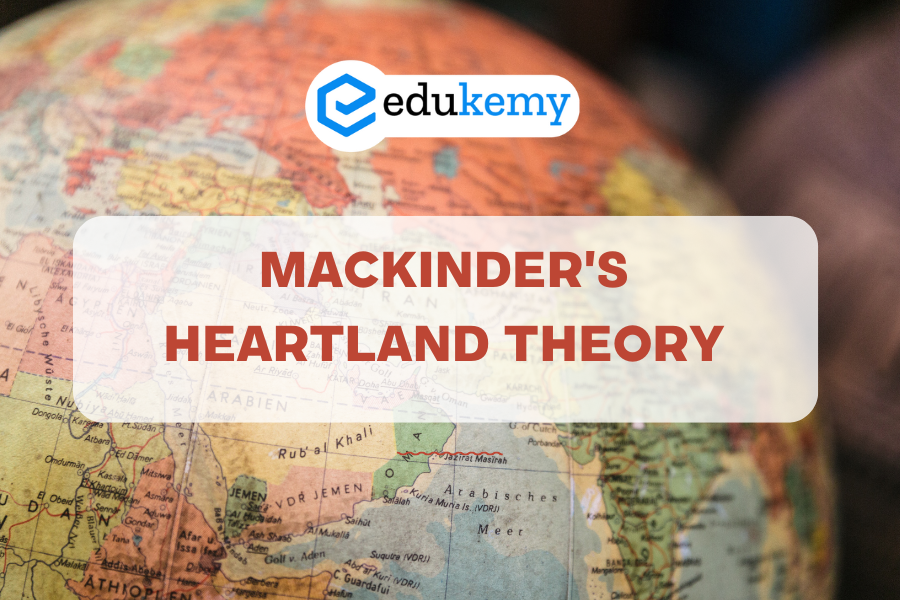Explore Mackinder’s Heartland Theory: Its origins, critique, and relevance in global geopolitics, from Cold War strategies to modern power dynamics.

Contents
- 1 Introduction
- 2 Background of Mackinder’s Heartland Theory
- 3 Check Shabbir Sir’s class notes here
- 4 Criticism of the Heartland Theory
- 5 Relevance in Contemporary Geopolitics
- 6 Comparison with Other Theories
- 7 Critique and Indian Perspective
- 8 Conclusion
- 9 To get free counseling/support on UPSC preparation from expert mentors please call 9773890604
Introduction
Geopolitical theories form a critical component of the geography optional syllabus, offering insight into global power dynamics. One of the most influential theories in this domain is Sir Halford Mackinder’s Heartland Theory. Proposed in 1904, it provides a framework for understanding the strategic significance of geographic regions in global politics and continues to influence geopolitics and international relations today.
Background of Mackinder’s Heartland Theory
Sir Halford Mackinder, a British geographer and geopolitician, presented the Heartland Theory in his paper, “The Geographical Pivot of History”. The theory emerged during a period marked by imperial rivalry, the expansion of industrial powers, and the development of global transportation networks.
Mackinder sought to explain how geography influences political power and control, emphasizing the importance of land-based dominance in a world where sea-based empires, such as Britain, had previously held sway.
Check Shabbir Sir’s class notes here
Click here to download
Criticism of the Heartland Theory
Mackinder’s theory, though groundbreaking, faced significant criticism:
1. Neglect of Technological Advancements
- The rise of air power and modern technologies, such as long-range missiles, diminished the Heartland’s inaccessibility.
- The theory underestimated the increasing importance of sea and air power in global conflicts.
2. Oversimplification
- The world is far more complex than a binary division into Heartland and Rimland regions.
- Other factors, such as political alliances, cultural ties, and economic systems, play significant roles in geopolitics.
3. Obsolescence in the Modern Context
- In a globalized world with interdependent economies, regional dominance is less relevant compared to global cooperation.
Relevance in Contemporary Geopolitics
Despite criticism, Mackinder’s Heartland Theory remains relevant in analyzing global power dynamics:
1. Cold War Context
- During the Cold War, the Soviet Union’s control over much of the Heartland underscored Mackinder’s ideas.
- The USA’s containment strategy, including the establishment of NATO, aimed to counter Soviet dominance in Eurasia.
2. Rise of China
- China’s Belt and Road Initiative (BRI) aligns with the Heartland concept by developing infrastructure across Central Asia, reviving the Silk Road to enhance connectivity and economic influence.
3. Energy Politics
- Central Asia and Siberia remain critical for global energy supplies, making the Heartland a region of strategic interest.
4. Russo-Ukrainian Conflict
- Russia’s attempts to assert influence in Eastern Europe and Central Asia reflect its desire to maintain a dominant position in the Heartland.
Comparison with Other Theories
| Aspect | Mackinder’s Heartland Theory | Spykman’s Rimland Theory |
| Core Idea | Land-based dominance determines power | Control of coastal areas is key to power |
| Strategic Region | Central Eurasia (Heartland) | Inner Crescent (Rimland) |
| Focus | Defensive strength of land power | Vulnerability and importance of sea power |
Critique and Indian Perspective
1. Limited Application to India
- India lies in the Inner Crescent and plays a pivotal role in the geopolitics of the Indian Ocean.
- Mackinder’s emphasis on land power overlooks India’s maritime strength and strategic position in the Indo-Pacific.
2. India’s Strategic Interests
- India’s growing ties with Central Asia through initiatives like the International North-South Transport Corridor (INSTC) reflect the importance of the Heartland for energy and trade.
- India’s engagement with Quad and Act East Policy aligns more with Rimland geopolitics.
Conclusion
Mackinder’s Heartland Theory remains a cornerstone of geopolitical thought, offering insights into the strategic value of regions and resources. While its assumptions and applications have evolved with time, the theory continues to shape discussions on global power dynamics.
For UPSC geography optional students, a deep understanding of this theory is essential not only to master geopolitical frameworks but also to critically evaluate its relevance in the modern context of globalization and multipolarity.
To get free counseling/support on UPSC preparation from expert mentors please call 9773890604
- Join Geography Optional Course – Click Here
- Get Geography Hard Copy notes – Click Here

